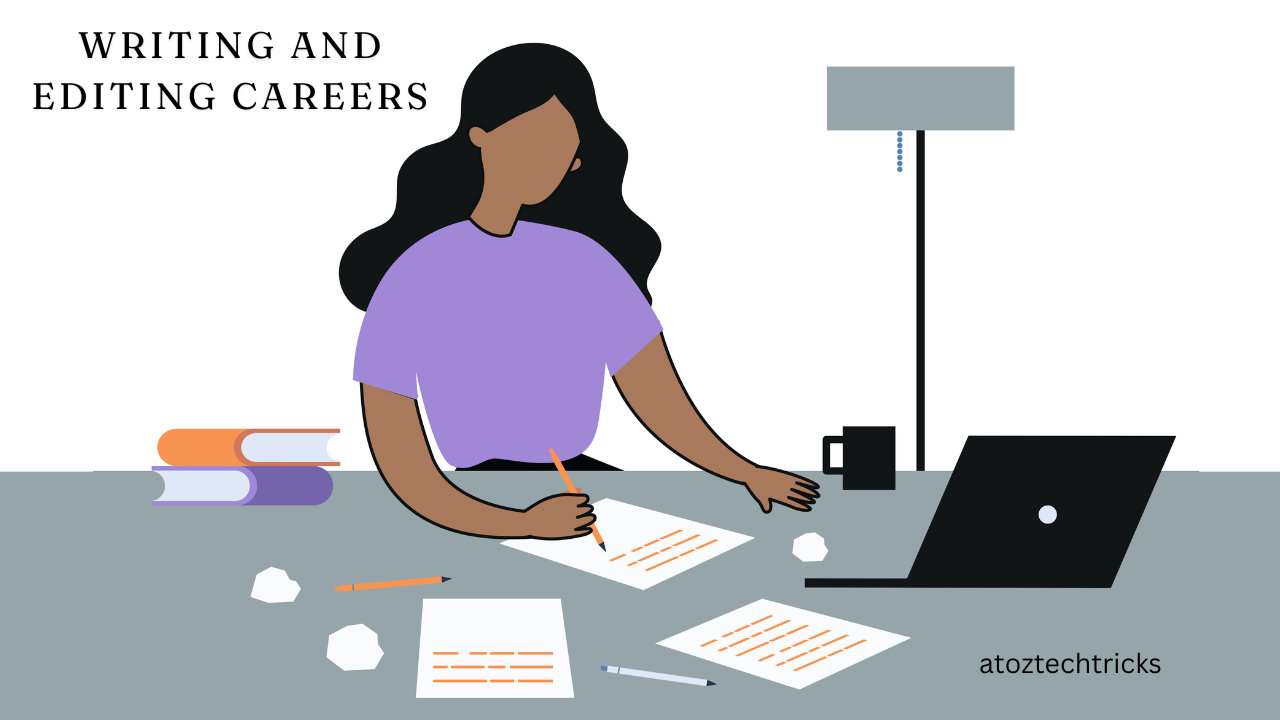Writing and Editing Careers: A Comprehensive Guide to Building a Successful Path
Writing and editing are foundational to communication, education, and entertainment across the globe. From crafting compelling narratives in fiction to ensuring clarity and accuracy in non-fiction, writing and editing careers offer diverse opportunities. This guide will delve into various aspects of these professions, including the types of writing and editing careers, the skills required, career paths, and how to get started in the industry.
1. Understanding Writing Careers
Writing is a broad field that encompasses various forms, each with its demands, styles, and audiences. Below are some of the most prominent writing careers:
1.1 Creative Writing
Creative writing involves crafting original works, including fiction, poetry and plays. Creative writers often aim to evoke emotions, convey themes, and tell stories that captivate readers. This type of writing demands a strong sense of imagination, character development, and mastery of language.
Examples:
- Novelists: Writers who produce long-form fiction. Successful novelists like J.K. Rowling and Stephen King have built their careers around creating compelling fictional worlds.
- Poets: Writers who express ideas, emotions, and narratives through verse. Poetry can range from traditional forms like sonnets to free verse.
- Playwrights: Writers who create scripts for theatre productions. Playwrights like Arthur Miller and Tennessee Williams are renowned for their impactful storytelling on stage.

1.2 Journalism
Journalism focuses on reporting news, investigating stories, and providing information to the public. Journalists need to adhere to ethical standards, ensuring accuracy, fairness, and objectivity. This field includes various specializations:
Examples:
- Reporters: Journalists who gather information, conduct interviews, and write articles or news segments. They often work in print, broadcast, or digital media.
- Investigative Journalists: Specialize in uncovering complex issues, often spending months or years on a single story. Their work can expose corruption, injustices, and other significant issues.
- Feature Writers: Focus on in-depth, narrative-driven pieces that explore people, trends, and topics in greater detail.
1.3 Technical Writing
Technical writing involves creating manuals, guides, and documentation for complex products or services. This career requires the ability to translate technical jargon into clear, understandable language for non-experts.
Examples:
- User Manual Writers: Create instruction manuals for products, ensuring users can understand and use them effectively.
- Software Documentation Writers: Develop documentation that explains software functionalities, often working closely with developers.
1.4 Content Writing
Content writing has become increasingly important with the rise of digital media. Content writers create blog posts, articles, website copy, and social media content, often focusing on SEO (Search Engine Optimization) to drive traffic.
Examples:
- Bloggers: Write articles or posts for personal or corporate blogs. Successful bloggers often specialize in a niche area like travel, technology, or lifestyle.
- Copywriters: Specialize in persuasive writing for marketing materials, including advertisements, email campaigns, and product descriptions.
- Social Media Writers: Craft engaging content for platforms like Twitter, Instagram, and LinkedIn, aiming to build brand awareness and engage followers.
1.5 Grant Writing
Grant writers are responsible for writing proposals to secure funding for organizations, particularly non-profits. This type of writing requires a strong understanding of the organization’s mission, and goals, and the ability to communicate the value of its work to potential funders.
1.6 Academic Writing
Academic writing includes creating scholarly articles, research papers, and textbooks. Academic writers often have advanced degrees in their field and focus on contributing to their discipline’s body of knowledge.
1.7 Scriptwriting
Scriptwriting is the art of creating scripts for films, television shows, video games, and other media. This career requires the ability to craft dialogue, plotlines, and character development that will be translated into visual and auditory storytelling.
Exploring Graphic Design Careers: Opportunities, Skills, and Future Prospects
2. Understanding Editing Careers
Editing is the process of reviewing, revising, and refining written content. Editors ensure that the text is clear, coherent, and free of errors. There are several types of editing careers:
2.1 Copyediting
Copyeditors focus on correcting grammar, punctuation, spelling, and syntax. They ensure that the text adheres to the appropriate style guide and maintains consistency throughout the document.
2.2 Developmental Editing
Developmental editors work on the structure and content of a manuscript, providing feedback on elements like plot, character development, and pacing in fiction, or argument structure and evidence in non-fiction. This role is crucial in the early stages of a book’s development.
2.3 Line Editing
Line editing involves a closer examination of the manuscript, focusing on the flow of sentences and paragraphs. Line editors enhance the readability and style of the text, ensuring that each sentence is clear and effective.
2.4 Proofreading
Proofreaders are the final eyes on a document before it is published. They catch any remaining typos, formatting issues, or minor errors that previous editors may have missed.
2.5 Content Editing
Content editors work in digital and print media, reviewing articles, blog posts, and other content to ensure they meet the publication’s standards. They may also guide writers on the tone, structure, and focus of their pieces.
2.6 Acquisitions Editing
Acquisitions editors work for publishers, seeking out and acquiring new manuscripts to publish. They evaluate submissions, negotiate contracts with authors, and often work closely with authors during the publication process.
2.7 Substantive Editing
Substantive editors perform a deep analysis of the text, making substantial revisions to improve the overall quality. This may involve rewriting sections, reordering content, and refining arguments or narratives.
3. Essential Skills for Writing and Editing Careers
Both writing and editing careers require a unique set of skills, many of which overlap. Here are some of the most critical abilities:
3.1 Language Mastery
A strong command of language is essential. This includes an understanding of grammar, vocabulary, and style. Writers and editors must also be familiar with different writing styles and conventions.
3.2 Attention to Detail
Editors, in particular, need to have a sharp eye for detail, catching errors and inconsistencies that could undermine the quality of the content.
3.3 Creativity
Writers must be able to generate ideas, create compelling narratives, and develop original content. Creativity is also important for editors, especially in developmental and line editing, where they may suggest ways to enhance the text.
3.4 Research Skills
Whether writing a novel set in a historical period or a technical manual, research is a crucial skill. Writers need to gather accurate information to create credible and informed content. Editors must verify facts and ensure accuracy.
3.5 Communication
Both writers and editors must be effective communicators. Writers need to convey their ideas clearly and persuasively. Editors must be able to give constructive feedback and work collaboratively with writers to improve the text.
3.6 Time Management
Meeting deadlines is critical in both writing and editing. Professionals in these fields often juggle multiple projects at once, making time management a vital skill.
3.7 Adaptability
The writing and editing industries are constantly evolving, especially with the rise of digital media. Professionals must be adaptable, willing to learn new tools and techniques and stay updated with industry trends.

4. Career Paths in Writing and Editing
Writing and editing careers can take many forms, from freelancing to full-time employment. Here’s a look at some common career paths:
4.1 Freelance Writing and Editing
Freelancing offers flexibility and the ability to work on a variety of projects. Freelancers can specialize in a particular niche or take on diverse assignments. However, freelancing also comes with challenges, such as finding clients, managing finances, and ensuring a steady income.
Pros:
- Flexibility in choosing projects and clients.
- Opportunity to work from anywhere.
- Potential for higher earnings through diverse projects.
Cons:
- Income can be unpredictable.
- Requires strong self-discipline and time management.
- Freelancers are responsible for their taxes and benefits.
4.2 In-House Writing and Editing
Many companies hire writers and editors as full-time employees. This could be in publishing, media, marketing, or corporate communications. In-house positions often offer more stability than freelancing, along with benefits like health insurance and retirement plans.
Pros:
- Steady income and job security.
- Access to benefits like health insurance and retirement plans.
- Opportunities for career advancement within the company.
Cons:
- Less flexibility in choosing projects.
- May involve more routine work.
- Office-based jobs may require commuting.
4.3 Working for a Publisher
Writers and editors can work directly for publishing houses, focusing on books, magazines, or journals. These roles often involve long-term projects, such as editing a book manuscript or writing a series of articles.
Pros:
- Opportunity to work on high-profile projects.
- Collaborate with other professionals in the industry.
- Access to industry events and networking opportunities.
Cons:
- Competitive field with high standards.
- Long hours, especially when meeting publication deadlines.
- Pressure to deliver high-quality work consistently.
4.4 Academic and Educational Writing
Academic writing and editing offer opportunities to produce textbooks, research papers, and educational content. This field often requires advanced degrees and expertise in a particular subject area.
Pros:
- Opportunity to contribute to the academic community.
- Potential for tenure and job security in academic institutions.
- Work can have a significant impact on education and research.
Cons:
- Requires advanced degrees and specialization.
- Academic publishing can be slow and rigorous.
- May involve a heavy workload with tight deadlines.
4.5 Journalism
Journalists can work for newspapers, magazines, online publications, or broadcast media. Careers in journalism often start with internships or entry-level positions, leading to more specialized roles such as investigative reporting or editorial leadership.
Pros:
- Opportunity to inform and educate the public.
- Work on stories that can have a significant impact.
- Potential for travel and meeting diverse people.
Cons:
- A high-pressure environment with tight deadlines.
- The industry is undergoing significant changes, with traditional media outlets facing challenges.
- Journalists may face risks, especially in conflict zones or when covering controversial topics.
5. How to Get Started in Writing and Editing
Breaking into writing and editing can be challenging, but with determination and the right approach, it’s possible to build a successful career. Here are some steps to get started:
5.1 Build a Portfolio
A strong portfolio is crucial for showcasing your skills. For writers, this might include published articles, short stories, or blog posts. Editors should include before-and-after examples of their work. Building a portfolio can start with personal projects, freelance work, or internships.
5.2 Get Educated
While not always required, a degree in English, journalism, communications, or a related field can be beneficial. There are also specialized courses and workshops available in areas like creative writing, technical writing, and editing.
5.3 Gain Experience
Internships, volunteer work, and entry-level positions are excellent ways to gain experience and make industry connections. Even unpaid work can provide valuable experience and lead to paid opportunities.
5.4 Network
Networking is essential in the writing and editing industries. Attend industry events, join professional organizations, and connect with other professionals on platforms like LinkedIn. Networking can lead to job opportunities, collaborations, and mentorship.
5.5 Develop a Niche
Specializing in a particular type of writing or editing can help you stand out in a crowded market. Whether it’s technical writing, fashion journalism, or developmental editing for fiction, developing a niche allows you to build expertise and attract clients or employers looking for your specific skills.
5.6 Stay Updated
The writing and editing industries are constantly evolving. Stay updated with industry trends, new tools, and changes in style guides. This might involve continuing education, subscribing to industry publications, or participating in online forums and communities.
5.7 Start Freelancing
Freelancing is a great way to gain experience, build a portfolio, and earn income while pursuing other opportunities. Platforms like Upwork, Fiverr, and Contently offer freelance writing and editing jobs. Building a freelance career requires persistence, but it can be rewarding.
6. Challenges and Opportunities in Writing and Editing Careers
Like any career, writing and editing come with challenges. However, they also offer unique opportunities for those willing to pursue them.
6.1 The Digital Shift
The rise of digital media has transformed writing and editing. While traditional print media faces challenges, digital platforms offer new opportunities. Writers and editors can reach global audiences through blogs, e-books, online magazines, and social media.
Opportunities:
- Increased demand for online content, including SEO writing, blogging, and digital journalism.
- Self-publishing platforms like Amazon Kindle Direct Publishing allow writers to bypass traditional publishers.
- Editors are needed to manage the vast amount of digital content produced daily.
Challenges:
- Digital media often pays less than traditional print media.
- Increased competition, as more people can easily publish online.
- The need to stay updated with digital tools and trends.
6.2 Maintaining Work-Life Balance
Freelancers, in particular, may struggle with work-life balance. The flexibility of freelancing can lead to irregular hours, overwork, and burnout. In-house editors and writers may also face long hours, especially when meeting deadlines.
Solutions:
- Set clear boundaries between work and personal life.
- Use productivity tools to manage time effectively.
- Take regular breaks and prioritize self-care.
6.3 Evolving Industry Standards
The writing and editing industries are constantly evolving. Changes in language usage, style guides, and industry standards can be challenging to keep up with.
Solutions:
- Regularly review style guides and industry publications.
- Participate in continuing education and professional development.
- Join professional organizations that provide resources and updates.
6.4 The Gig Economy
The gig economy has made freelance writing and editing more accessible, but it has also increased competition and driven down rates for some services. Writers and editors must navigate this landscape carefully to build sustainable careers.
Opportunities:
- Freelancers can work with clients worldwide.
- Diverse projects and opportunities allow for skill development.
- The ability to set your rates and choose your clients.
Challenges:
- Finding consistent work and maintaining a steady income.
- Competing with freelancers who may offer lower rates.
- Managing the business side of freelancing, including taxes and contracts.
Writing and editing careers offer a wide range of opportunities for those with a passion for language, creativity, and communication. Whether you’re interested in crafting compelling narratives, reporting the news, or refining the work of others, there is a path for you in these fields. While the journey may be challenging, with dedication, continuous learning, and a strong network, you can build a successful and fulfilling career in writing and editing.




Post Comment